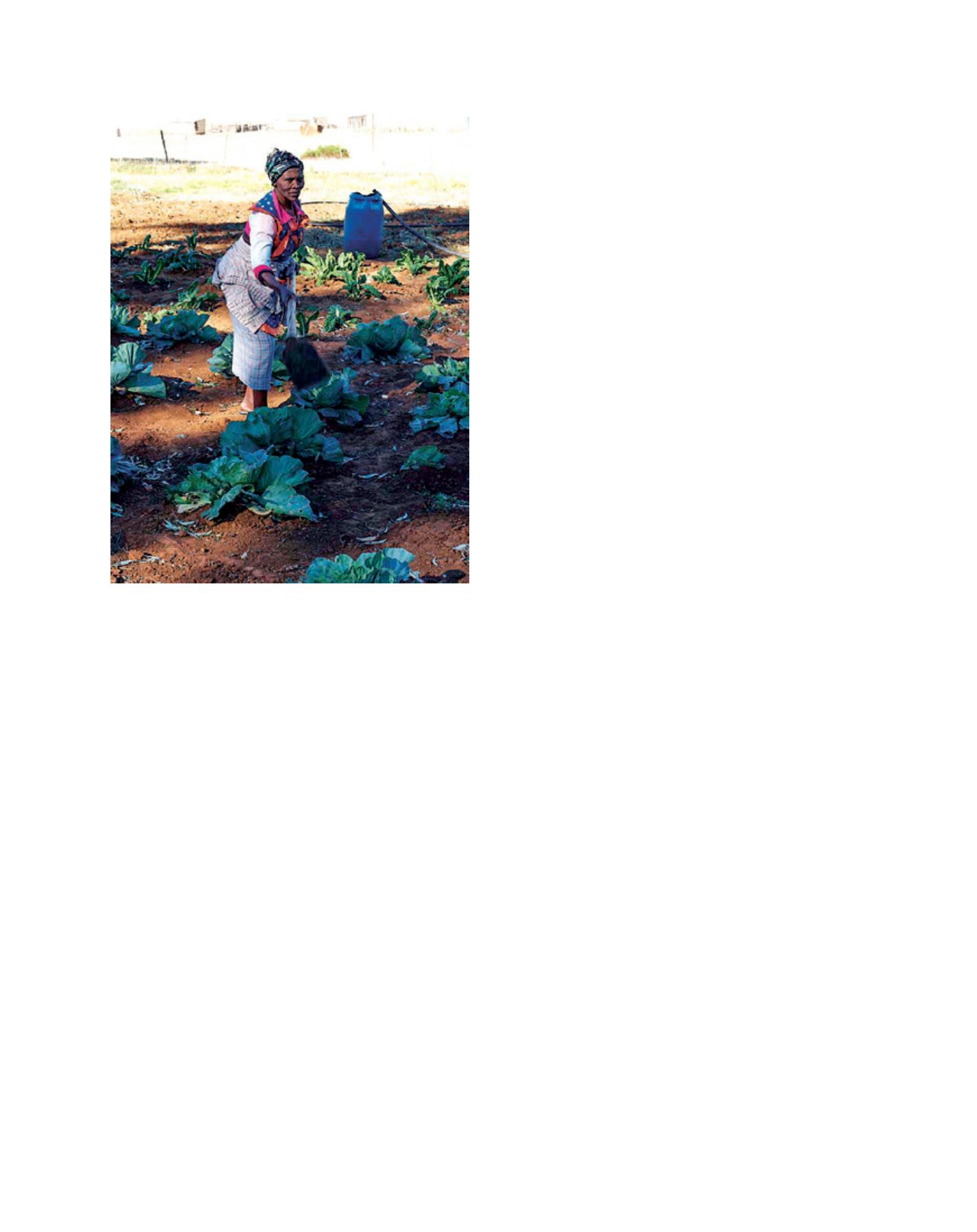

[
] 229
Image: AFASA
Agriculture is the cornerstone of rural development in South Africa. There
is a need to support smallholder farmers so they can increase production
highly subsidized tillage means; free government extensions
services; free vaccination, dipping, fodder banks and good
quality livestock breeding material).
When dealing with family farming challenges, one should
always have a holistic approach, where all relevant elements
share equal attention rather than focusing on one isolated
element of farmer support and development. Based on
AFASA’s ‘on-farm practical experience’, NERPO has devel-
oped a ‘wagon wheel’ holistic approach to farmer support
and development. In this approach, the farmer is the core
focus, needing a balanced support. Over the years, AFASA
and NERPO have tabled a number of policy proposals to the
South African Government in support of the farmers, espe-
cially with regard to land issues, access to credit, information
and formal markets.
AFASA and NERPO are the main national farmers’ associa-
tions in South Africa that facilitate the development of African
farmers in order to increase their meaningful participation
in the commercial agricultural sector. The two associations
advocate for partnerships based on complementarity of the
strengths of public and private sector role-players.
The public sector, for example, has been spending much
money in the development and transformation of the agri-
cultural sector but not achieving the intended results,
probably due to limited expertise or capacity. Hence, there
is a need to partner with the relevant private companies
or entities with the necessary skills and resources for
better results. Putting the smallholder farmers at the heart
of partnerships and involving them under fair terms and
conditions as well as ensuring effective mechanisms of
cooperation is imperative.
The South African Government has put in place a
number of programmes to assist smallholder farmers, but
these programmes seem not to be enough to boost agri-
cultural production. The government support system is
failing to transform emerging farmers into commercial
farmers who can sustain themselves and contribute to the
growth of the agricultural sector. There is also lack of a
proper strategy to design support packages that deal with
the needs of specific groups of farmers. Lack of coordina-
tion of the farmer support programmes is another problem
that hinders farmers in maximizing the benefits they can
get from government support.
The easiest way of segmenting farmers in South Africa is
through the land tenure system. There are basically three
tenure systems in the country, namely land ownership with
title deeds; land owned through leasing from the state; and
communal/tribal land (former homeland areas, land owned
through the local authority of a chief).
Cooperatives are a good conduit to use in order to have
coordinated support for farmers. These cooperatives are struc-
tures that can coordinate all agricultural activities on behalf of
their members. However, a number of cooperatives in South
Africa are dysfunctional even though they are properly regis-
tered. This calls for a support package that ensures that the
cooperatives that are active and producing are given first pref-
erence with respect to farm machinery, inputs and insurance
subsidies in order to boost their production capacity. Part of
the package should include a revitalization strategy to resus-
citate the dormant agricultural cooperatives.
The AFASA cooperative chamber has embarked on a drive
to bring the agricultural primary cooperatives together and
form one secondary cooperative per district municipality.
The thinking behind this is to create a coordinating struc-
ture that will spearhead agricultural production and ensure
that the farmers also access local, national and international
markets in a structured way. The secondary cooperative
model will create an organized structure, taking responsi-
bility for receiving government funding and implementing
agricultural production projects using evidence-based plan-
ning. This structure will have sole responsibility for
coordinating all agricultural activities and ensure that there
is proper planning from production on the farm to the
marketing of agricultural produce.
Agriculture remains the cornerstone of rural develop-
ment in a country like South Africa. Hence there is a need to
support smallholder farmers so that they increase agricultural
production. The smallholder farmer support package model
must be farmer segment-specific to address the needs of small-
holder farmers in these segments. Monitoring and evaluation
of progress is very important so as to make adjustments
where necessary, and to continuously supervise the farmers
to ensure that they focus on production on their farms. These
farmers must also accept that once they start to operate profit-
able agricultural production on their farms, support for them
will gradually be withdrawn and transferred to more needy
fellow smallholder farmers.
D
eep
R
oots
















